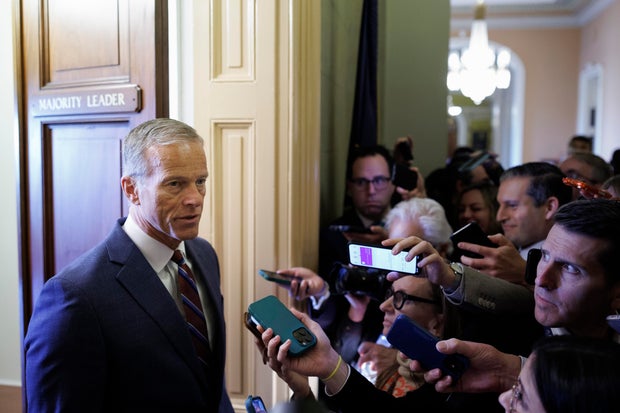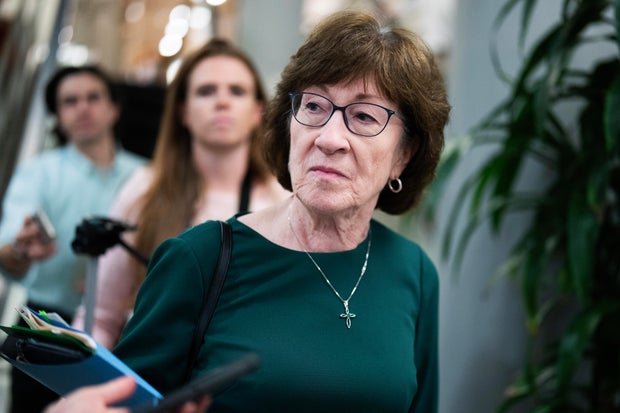Washington — With the government shutdown finally in the rearview mirror, the focus in the Senate is turning to an upcoming fight over health care, with Democrats hoping to regroup after splintering in the final stages of the showdown.
Eight Senate Democrats broke ranks to reach a deal with Republicans to end the shutdown, dashing the party’s effort to win an extension of expiring Affordable Care Act tax credits in return for their vote to reopen the government. Now, Democrats face a quick timeline to shift their strategy.
As part of the deal, Democrats secured a promise to hold a vote next month on the tax credits, which help millions of Americans pay for health insurance premiums for plans purchased on state exchanges. And while Democrats have pledged to continue the fight, exactly what that looks like, and whether it could find enough support to pass, remains to be seen.
“What we have to make sure of now is that the health care fight lives outside of the appropriations process and doesn’t depend entirely on the government being shut down,” Democratic Sen. Brian Schatz of Hawaii told reporters earlier this week. “So now we have a fight in front of us.”
Reaching consensus on health care
Senate Democrats must now weigh their approach. With the promise of a vote on legislation of their choosing, they have an opportunity to try to chart a bipartisan path forward, with the option of forcing Republicans to take a politically perilous vote if a deal fails to materialize.
In recent days, Democrats have said they see signs of bipartisan interest in addressing health care costs. A handful of moderate Republicans have expressed openness to a tax-credit extension, albeit with some reforms. Any bill would need 60 votes to pass in the Senate.
Sen. Tammy Baldwin, a Wisconsin Democrat, said on Monday that she’s “talked to so many of my Republican colleagues who want to do something here — who want to keep health care costs down for their constituents.” But when Baldwin sought to amend the funding package to include a one-year extension of the ACA tax credits, the vote didn’t pick up GOP support. Days earlier, when Senate Minority Leader Chuck Schumer said Democrats would reopen the government if Republicans agreed to a one-year extension of the health insurance tax credits, Republicans likewise rejected the offer.
But with the shutdown behind them, Republicans have expressed willingness to negotiate on the health care issue. And Senate Majority Leader John Thune told reporters this week that he sees a bipartisan path forward, noting that any extension of the tax credits “obviously … can’t be without reforms.”
“But my expectation is at some point, the president is going to be very inclined to want to do something to make health care more affordable in this country,” Thune said. “So if there is a willingness on the part of Democrats to work with Republicans to deal with the unaffordability of Obamacare in its current form, then there might be an opportunity to do something bipartisan.”
Thune has said that a number of Republicans are already engaged in conversations on the health care issue or have a high level of interest. He pointed to Sen. Roger Marshall of Kansas, a physician, as someone with expertise on the issue, along with Sens. Bill Cassidy of Louisiana, Mike Crapo of Idaho and Rick Scott of Florida, who lead the relevant committees.
“So there are a number of them that have already started to work on some things, and there are already some discussions going on with folks on the other side of the aisle about what might be a path forward,” Thune said. “We’ll see where it lands.”
Similarly, Sen. Susan Collins, a Maine Republican, said she supports an extension of the ACA tax credits, “but they need reform,” she said, citing specifically a need for caps on the income of those who are eligible for them.
Collins said there are other ideas that have been raised by Republicans on reforming the ACA to make health insurance more affordable, pointing to pledges from Crapo and Cassidy to hold hearings on the issue and Thune’s commitment to bring up a vote.
But other parts of the conference seem to be eyeing a different approach.
A Republican split
The efforts to find bipartisan consensus on the tax credits were complicated by President Trump’s criticism of the Affordable Care Act in recent days. He urged Republicans to take bolder action by overhauling Obamacare and redirect funds from insurance companies straight to the American people.
Republicans have heavily criticized the Affordable Care Act since it became law in 2010. But last weekend, following a flurry of posts from the president on Truth Social, a number of GOP senators spent hours railing against the Affordable Care Act on the Senate floor, while some expressed support for broader changes to the health insurance industry.
Sen. Lindsey Graham, a South Carolina Republican and close ally of the president, touted Mr. Trump’s call to overhaul Obamacare over the weekend, congratulating the president for getting “into the game,” saying “he’s given us a pathway forward. I am going to heed his advice and counsel.”
Graham said Mr. Trump would “like to sit down and see if we can come up with a better solution.”
Democrats pledge to continue the fight
Even if some version of an extension does pass the Senate, House Speaker Mike Johnson has not committed to bringing it up in the House, where a compromise would likely face stronger headwinds.
And some Senate Democrats have appeared less positive about a bipartisan solution, though they pledged to continue the fight to lower health care costs.
Sen. Patty Murray of Washington criticized Republicans for refusing an offer from Democrats for a one-year extension of the ACA tax credits on Monday, saying it’s “truly the most straightforward and common-sense thing we can do for people facing gigantic premium hikes this year.”
“Republicans have gone from saying nothing about health care costs all year long to saying ‘later, later, later,’ even after we are over a week into open enrollment, and wasting every bit of time we had for real negotiations,” Murray said. “Then, incredibly, Republicans started saying, let’s scrap the Affordable Care Act altogether.”
Still, she insisted that “this fight is not over — far from it — because I and many of us have no intention of letting Republicans off the hook.”
“The reality is, there is a point where it will be too late to make a meaningful difference,” Murray said. “But until we reach that point of no return, we do have to fight tooth and nail to force Republicans to actually work with us on that issue.”
Schumer likewise pledged to keep up the fight on health care, saying it “will and must continue.”
“We will not give up this fight,” Schumer said. “We will deliver for the American people.”




